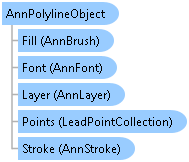
function Leadtools.Annotations.Core.AnnPolylineObject()
The polyline object is a simple polyline that contains a collection of Leadtools.LeadPointD points and a stroke
With the automated functions, on systems with mouse support, each line segment is formed with a mouse click, and the object is completed on a double-click.
With the automated functions, on systems with touch support, the first line segment starts with the first tap and hold. Each successive tap and hold, hold for 1.5 seconds, results in a new line segment. The object is completed by the user removing the finger from the device.
Programmatically, the boundaries and location of the polyline object can be controlled using the following properties:
Each object can be transformed with the following methods:
The AnnPolylineObject class inherits a number of properties from the AnnObject class, providing support for font, stroke and fill characteristics. These properties are listed below:
The name of the polyline object can be controlled using Labels property, inherited from the AnnObject class.
An object can be part of a group annotation object or part of a container object. It cannot be part of both a group and a container at the same time.
The following properties can also be used to programmatically set characteristics of an AnnPolylineObject:
This example creates a polyline object and adds it to the automation container.
example: function SiteLibrary_DefaultPage$example() { // assumes _automation is valid var inch = 720.0; // Add a freehand hotspot object var polyLineObj = new lt.Annotations.Core.AnnPolylineObject(); // Set the points for the freehand hotspot polyLineObj.get_points().add(lt.LeadPointD.create(1 * inch, 1 * inch)); polyLineObj.get_points().add(lt.LeadPointD.create(2 * inch, 2 * inch)); polyLineObj.get_points().add(lt.LeadPointD.create(1 * inch, 5 * inch)); polyLineObj.get_points().add(lt.LeadPointD.create(5 * inch, 5 * inch)); polyLineObj.get_points().add(lt.LeadPointD.create(4 * inch, 2 * inch)); polyLineObj.get_points().add(lt.LeadPointD.create(5 * inch, 1 * inch)); // Set the stroke polyLineObj.set_stroke(lt.Annotations.Core.AnnStroke.create(lt.Annotations.Core.AnnSolidColorBrush.create("red"), lt.LeadLengthD.create(3))); // Set the fill polyLineObj.set_fill(lt.Annotations.Core.AnnSolidColorBrush.create("green")); // Set the figure to closed polyLineObj.set_isClosed(true); // Add the object to the automation container this._automation.get_container().get_children().add(polyLineObj); // Select the object this._automation.selectObject(polyLineObj); },